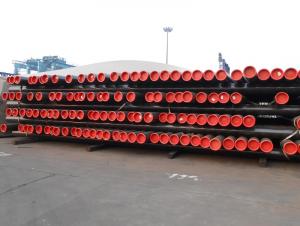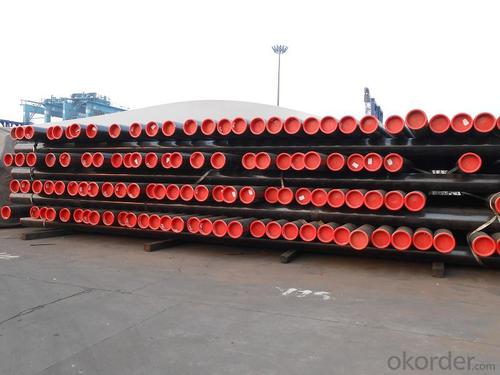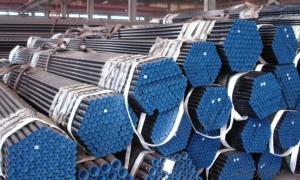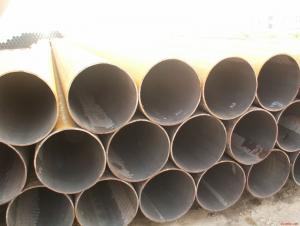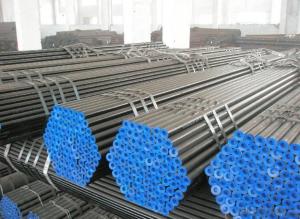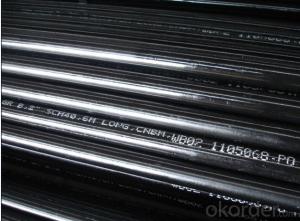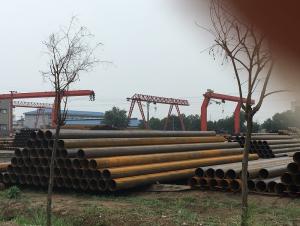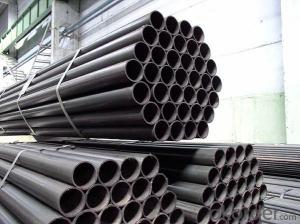High grade seamless steel pipe for petroleum
- Loading Port:
- Tianjin
- Payment Terms:
- TT or LC
- Min Order Qty:
- 40 m.t.
- Supply Capability:
- 15000 m.t./month
OKorder Service Pledge
OKorder Financial Service
You Might Also Like
1、Structure of High grade seamless steel pipe for petroleum :
Seamless pipe is formed by drawing a solid billet over a piercing rod to create the hollow shell. As the manufacturing process does not include any welding, seamless pipes are perceived to be stronger and more reliable. Historically seamless pipe was regarded as withstanding pressure better than other types, and was often more easily available than welded pipe.
2、Main Features of High grade seamless steel pipe for petroleum :
• High manufacturing accuracy
• High strength
• Small inertia resistance
• Strong heat dissipation ability
• Good visual effect
• Reasonable price
3、 High grade seamless steel pipe for petroleum Specification:
Standard | GB, DIN, ASTM ASTM A106-2006, ASTM A53-2007 |
Grade | 10#-45#, 16Mn 10#, 20#, 45#, 16Mn |
Thickness | 8 - 33 mm |
Section Shape | Round |
Outer Diameter | 133 - 219 mm |
Place of Origin | Shandong, China (Mainland) |
Secondary Or Not | Non-secondary |
Application | Hydraulic Pipe |
Technique | Cold Drawn |
Certification | API |
Surface Treatment | factory state or painted black |
Special Pipe | API Pipe |
Alloy Or Not | Non-alloy |
Length | 5-12M |
Outer Diameter | 21.3-610mm |
Grade | 20#, 45#, Q345, API J55, API K55, API L80, API N80, API P110, A53B |
Standard | ASME, ASTM |
1) Material:20#(ASTM A 106/A53 GRB.API5LGRB,GB),45#,16Mn,10#.
2) Specification range:OD:21.3-610mm,WT:6-70mm,length:6-12m or according to the requirement of clients.
3) Excutive standards:GB,ASME API5L.ASTM A 106/A53,Despite of the above standards,we can also supply seamless steel pipe with standard of DIN,JIS,and so on,and also develop new products according to the requirements of our clients!
4) Surface:black lacquered,varnish coating or galvanized.
5) Ends:Beveled or square cut,plastic capped,painted.
6) Packing:bundles wrapped with strong steel strip,seaworthy packing.
4、Packaging & Delivery
Packaging Details: | seaworthy package,bundles wrapped with strong steel strip |
Delivery Detail: | 15-30days after received 30%TT |
5、FAQ of High grade seamless steel pipe for petroleum :
①How is the quality of your products?
Our products are manufactured strictly according to national and internaional standard, and we take a test
on every pipe before delivered out. If you want see our quality certifications and all kinds of testing report, please just ask us for it.
Guaranteed: If products’ quality don’t accord to discription as we give or the promise before you place order, we promise 100% refund.
②How about price?
Yes, we are factory and be able to give you lowest price below market one, and we have a policy that “ for saving time and absolutely honest business attitude, we quote as lowest as possible for any customer, and discount can be given according to quantity”,if you like bargain and factory price is not low enough as you think, just don’t waste your time.Please trust the quotation we would give you, it is professional one.
③Why should you chose us?
Chose happens because of quality, then price, We can give you both.Additionally, we can also offer professional products inquiry, products knowledge train(for agents), smooth goods delivery, exellent customer solution proposals.Our service formula: good quality+good price+good service=customer’s trust
SGS test is available, customer inspection before shipping is welcome, third party inspection is no problem.
6、 High grade seamless steel pipe for petroleum Images:
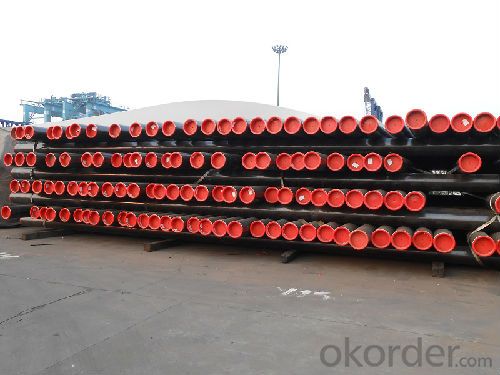
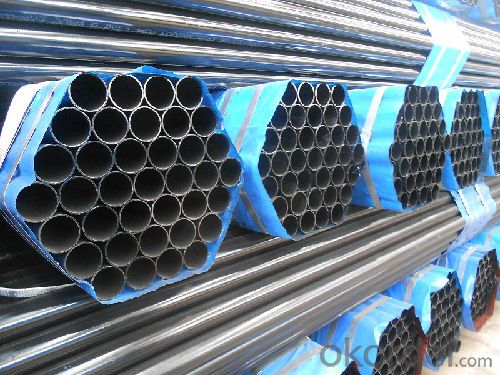
- Q: Can steel pipes be used for stadium construction?
- Yes, steel pipes can be used for stadium construction. Steel pipes offer several advantages that make them suitable for this purpose. Firstly, steel pipes are strong and durable, making them capable of withstanding heavy loads and providing structural stability to large structures like stadiums. They have high tensile strength, which means they can resist bending or breaking under pressure. Additionally, steel pipes are resistant to corrosion, which is crucial for outdoor structures like stadiums that are exposed to various weather conditions. Their resistance to rust and other forms of degradation ensures the longevity of the stadium. Furthermore, steel pipes are versatile and can be easily fabricated into different shapes and sizes, allowing for customized designs and efficient installation. Moreover, steel pipes offer cost-effectiveness in stadium construction. They can be easily produced in large quantities, making them readily available and affordable. The ease of transportation and installation of steel pipes also contributes to their cost-effectiveness. Another advantage of using steel pipes for stadium construction is their sustainability. Steel is a recyclable material, and using steel pipes promotes environmental responsibility. The recyclability of steel reduces the demand for new materials and minimizes waste. In summary, steel pipes can indeed be used for stadium construction due to their strength, durability, resistance to corrosion, versatility, cost-effectiveness, and sustainability.
- Q: How do steel pipes compare to ductile iron pipes?
- Steel pipes and ductile iron pipes are utilized in various applications, but they possess distinct differences in terms of their properties and advantages. 1. Strength and Durability: Steel pipes exhibit greater strength and durability compared to ductile iron pipes. Steel possesses a higher tensile strength, making it less susceptible to cracking or breaking under pressure or external forces. Conversely, ductile iron possesses a lower tensile strength but boasts better impact resistance than steel. 2. Corrosion Resistance: Steel pipes are susceptible to corrosion, especially when exposed to moisture or chemicals. Nevertheless, protective measures such as applying coatings or employing corrosion-resistant alloys can safeguard against this. Ductile iron pipes, while inherently more corrosion-resistant than regular cast iron, may still necessitate external protection to prevent rusting and degradation. 3. Flexibility: Ductile iron pipes offer greater flexibility than steel pipes. They can endure certain degrees of bending and deflection without fracturing, making them suitable for applications where ground movement or shifting may occur. Conversely, steel pipes are less flexible and more rigid, rendering them better suited for straight runs or applications with minimal movement. 4. Cost: Generally, ductile iron pipes are more cost-effective than steel pipes. The manufacturing process for ductile iron is easier and cheaper, resulting in lower production costs. However, steel pipes may possess a longer lifespan, requiring fewer replacements over time, thereby offsetting the initial cost difference. 5. Installation: Steel pipes are lighter and easier to handle during installation compared to ductile iron pipes, which can be heavy and bulky. The lighter weight of steel pipes can reduce labor and transportation costs. Moreover, steel pipes can be welded, allowing for more flexible installation options, while ductile iron pipes are typically joined using mechanical couplings or flanged connections. In conclusion, steel pipes offer superior strength and durability, while ductile iron pipes provide better flexibility and cost-effectiveness. The selection between the two depends on the specific requirements of the application, including factors such as corrosion resistance, expected loads, installation conditions, and budget constraints.
- Q: What is the standard length of a steel pipe?
- The standard length of a steel pipe can vary depending on the industry and application. However, in general, the standard lengths of steel pipes range from 18 to 24 feet. These lengths are commonly used in construction, plumbing, and other industrial applications. It is important to note that custom lengths can also be obtained to suit specific project requirements.
- Q: Can steel pipes be used for conveying chemicals?
- Steel pipes are capable of conveying chemicals. Steel, being a robust and long-lasting material, can endure high pressure and temperature conditions. This makes it suitable for the transportation of diverse chemicals. Moreover, steel pipes possess exceptional resistance against corrosion, which is particularly crucial when handling corrosive substances. They find common usage in industries such as oil and gas, chemical processing, and water treatment, where the secure and efficient conveyance of chemicals is indispensable. However, it is essential to consider the specific requirements of the chemical being transported and ensure compatibility with the steel pipe. It may be necessary to select the appropriate material, including the utilization of corrosion-resistant coatings or linings, to prevent any adverse reactions between the chemicals and the steel pipe.
- Q: Can steel pipes be used for conveying sewage and wastewater?
- Indeed, sewage and wastewater can be conveyed using steel pipes. The use of steel pipes is widespread in sewage and wastewater systems owing to their robustness and resilience. They possess corrosion resistance and can endure immense pressure and flow rates. Moreover, steel pipes have the capability to manage the rigorous chemicals and pollutants found in sewage and wastewater without impairing or compromising the fluid quality. Nonetheless, it is crucial to guarantee proper coating or lining of the steel pipes to avert any potential problems concerning corrosion or contamination. Regular maintenance and inspections are equally important to detect and rectify any potential concerns that may arise within the system.
- Q: Are steel pipes suitable for semiconductor manufacturing plants?
- Yes, steel pipes are suitable for semiconductor manufacturing plants. Steel pipes offer several advantages such as high strength, durability, and resistance to corrosion, making them ideal for transporting various fluids and gases used in semiconductor manufacturing processes. Additionally, steel pipes can withstand high pressure and extreme temperatures, ensuring the safe and efficient operation of semiconductor manufacturing plants.
- Q: How do you clean steel pipes?
- To clean steel pipes, you can start by flushing them with water to remove any loose debris or dirt. Next, you can use a suitable cleaning solution specifically designed for steel pipes and apply it using a brush or sponge. Scrub the pipes thoroughly, paying attention to any stubborn stains or buildup. Rinse the pipes with water again to remove the cleaning solution, and finally, dry them thoroughly to prevent rusting.
- Q: How do you calculate the flow rate through a steel pipe?
- The flow rate through a steel pipe can be calculated using the formula Q = A * v, where Q is the flow rate, A is the cross-sectional area of the pipe, and v is the velocity of the fluid flowing through the pipe.
- Q: How are steel pipes made?
- Steel pipes are made through a process called pipe manufacturing, which involves several steps. First, raw materials such as iron ore, coal, and limestone are melted in a blast furnace to produce molten iron. The molten iron is then mixed with recycled steel and processed in a basic oxygen furnace or electric arc furnace to refine its composition and remove impurities. Once the desired steel grade is achieved, it is cast into billets, which are heated and pierced to form a hollow cylindrical shape. These pierced billets are then elongated and shaped into pipes through a process called hot rolling or cold drawing. Finally, the pipes undergo various finishing operations, such as straightening, cutting, and inspection, before being ready for use in various applications.
- Q: Can steel pipes be used for drainage systems?
- Yes, steel pipes can be used for drainage systems. Steel pipes are durable, strong, and resistant to corrosion, making them suitable for various applications, including drainage systems. They can effectively transport water and waste materials, ensuring efficient drainage.
Send your message to us
High grade seamless steel pipe for petroleum
- Loading Port:
- Tianjin
- Payment Terms:
- TT or LC
- Min Order Qty:
- 40 m.t.
- Supply Capability:
- 15000 m.t./month
OKorder Service Pledge
OKorder Financial Service
Similar products
Hot products
Hot Searches
Related keywords
